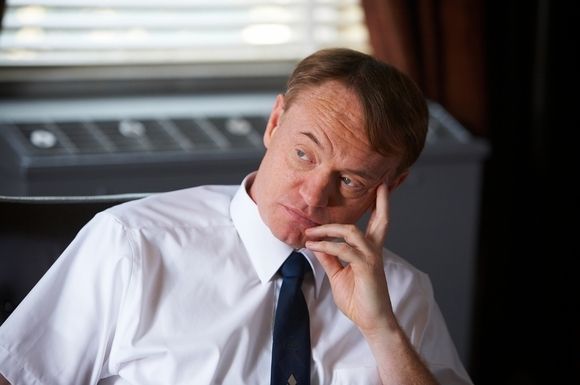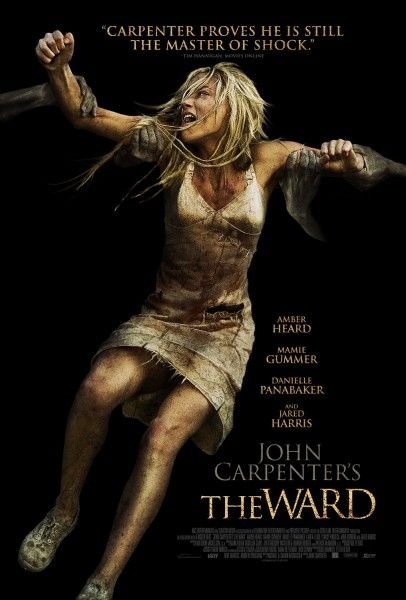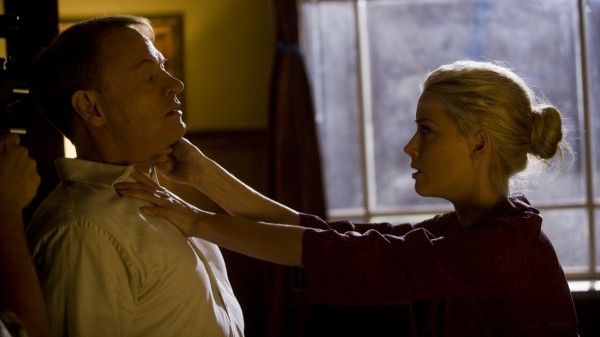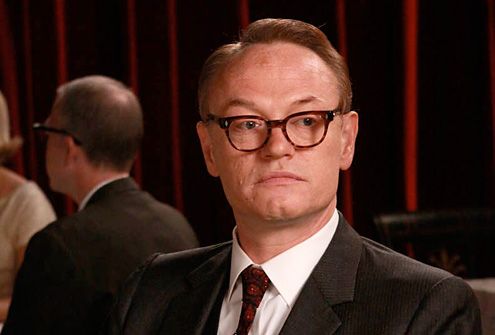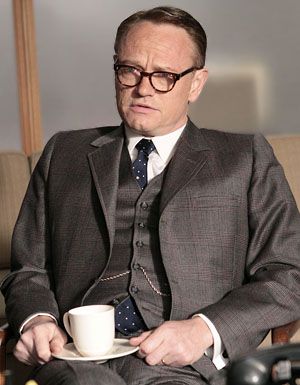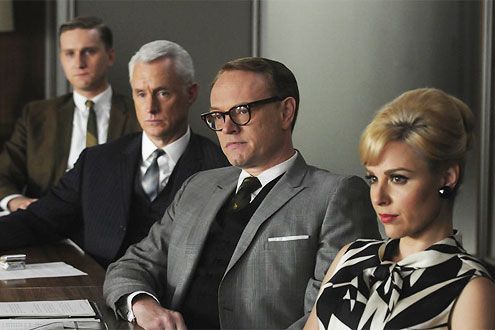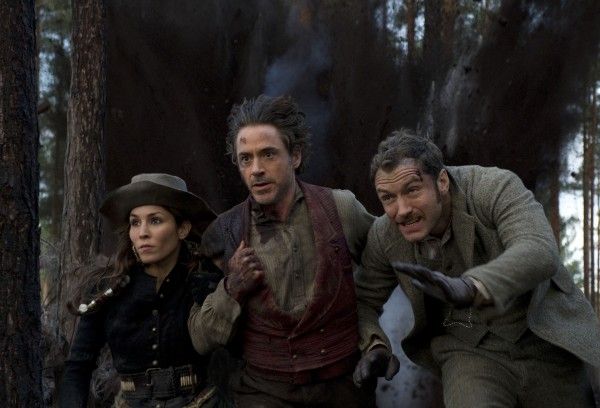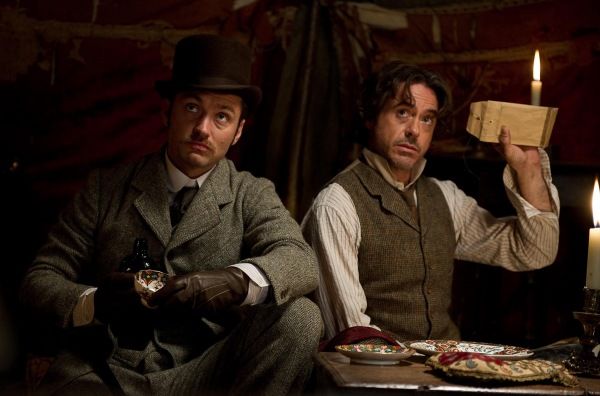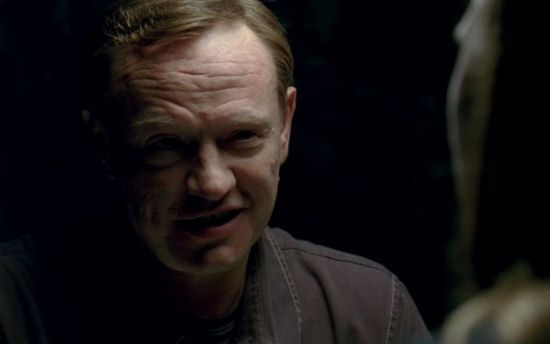With director John Carpenter's The Ward opening in limited release this weekend, I recently conducted an extended interview with Jared Harris. In The Ward, Harris plays Dr. Stringer, the head of a mental institution which houses a young girl (Amber Heard) who is being terrorized by a ghost. During the interview, Harris talked about how he got involved in The Ward, what it was like to work for John Carpenter, and how his character changed over the course of filming.
In addition, Harris also talked about his upcoming work as the villain Moriarty in Sherlock Holmes: A Game of Shadows, what it was like to make the movie, his character arc on Fringe, what's up with Mad Men and what it's really like to make the show, what the last few years have been like as he's landed some high profile jobs, great movie villains, and he reveals that he's a big Star Trek fan,. Hit the jump for the interview.
Before every extended interview, we like to offer a few bullet points. Here's five things I learned while talking to Harris:
- Harris is a Trekkie. He attended the Hero Complex Film Festival to see Wrath of Khan on the big screen, and talks quite a bit about the Star Trek series as a whole.
- They shoot seven or eight pages a day on Mad Men—which is a lot compared to most shows. He says the cast and crew work at incredibly high standards.
- Mad Men creator Matthew Weiner is extremely particular about the scripts. Every line of dialogue and stage direction in the script has to be delivered exactly how it’s written. Harris recounts once being told that he had left out a comma in his delivery.
- His casting as the villain Moriarty in Sherlock Holmes: A Game of Shadows was up in the air for a while. The powers-that-be were wavering between hiring a star/name-actor for the role, or casting a lesser known character actor instead.
- He believes the key to the greatest movie villains of all time is that there’s no explanation for why they’re so evil. The fascination and fear comes from the unknown.
As usual, I'm offering you two ways to get he interview: you can either click here for the audio, or the full transcript is below. Finally, a HUGE thank you to Jared Harris for giving me so much of his time.
Collider: How are you doing today?
Jared Harris: I’m doing good, yourself?
I’m doing excellent.
Harris: Did you go to the Iron Man double bill at the Hero Complex Film Festival?
I had a badge for the entire Hero Complex event, so I went every single night.
Harris: Who was the surprise special guest at the Iron Man thing?
It was Jon Favreau and then after a few minutes the surprise guest was Robert Downey Jr.
Harris: Woo!
In fact I believe you know Mr. Robert Downey Jr.
Harris: A little bit, yeah sure (laughs).
You and I ran into each other at the Hero Complex Film Festival. How did you end up there? You were there for Superman?
Harris: No, I went there for Star Trek. I’m a big Star Trek fan. I went to go see Wrath of Khan, and then I wanted to hear what the director had to say. Then we stayed on for the 2009 version.
How did you end up there? Did you hear about it or read about it?
Harris: I’m friends with Greg Schwenke who runs the Newport Beach Film Festival and he goes to all those events, he goes to all the film festivals and everything and he wanted to know if I wanted to come along and I said, “Yep!”
Obviously you’ve seen Wrath of Khan before, is that your favorite or did you just love J.J.’s one?
Harris: No, no Wrath of Khan I really enjoyed. There’s a bunch of them I really enjoyed, I really enjoyed Undiscovered Country, I thought First Contact was fantastic. I just enjoy that whole Star Trek thing; I’m a big Trekkie fan. And I was really interested in seeing those two movies next to each other because you can see what they borrowed from Wrath of Khan, and what they were going after in that one.
Yeah I think J.J.’s movie and Wrath of Khan are both phenomenal films.
Harris: Yeah, I mean I’m a fan of the old series and of the old characters and everything. I’m a little bit the same way as the old Sean Connery James Bond issue, you know for me it began and ends with Sean Connery and stuff like that. Although I love The Next Generation and Patrick Stewart and those guys, but I just felt that the dynamics between the characters were stronger for whatever reason on the first lot.
How did you get involved with The Ward and what was it like working with John Carpenter?
Harris: I got involved through someone I used to know in college. He runs the film company now, so we got in touch with each other and I came in and chatted with him and he said he had this thing and would I be interested. They were out to some other actors, but it didn’t look like it was gonna work and would it be something that I would be interested in and I said, “I can say right now hell yes, it’s John Carpenter. Send me the script.” So that’s how I got involved. And then I read the script and it was good fun and I could see exactly how this worked and being in a John Carpenter movie. I love his films, I remember where I was when I saw Assault on Precinct 13, I remember going to see Halloween in the West End, I remember going to see The Thing in North Carolina when I was at Duke, Starman at Times Square in New York. You know, I love his films.
How long did it take for you to start being sort of a movie nerd/geek and start asking John fan questions, if at all?
Harris: Well I think it’s alright to ask questions like that. He doesn’t like to sit there and chit-chat on set, so if you were on the way to lunch or something like that he’d sit and talk about the other movies and some of the questions and famous stories that you know about these films and stuff like that. But when you’re on set, he doesn’t want to chit-chat, he wants any conversation to be about solving the problem of why you’re not shooting the next shot. I probably got to talk to him a little bit more about that after we were done or the couple times we went out for dinner or we had a drink or something like that.
When you’re on a film, obviously when you first sign on the script might be one way and then there’s rewriting, characters change, things get adjusted. How much changed over the course of filming for your character on the project, if at all?
Harris: Not a lot, they were tightening up the story. It’s very difficult when you do a story like this, without giving too much away, where there’s a big reveal at the end of the story. There are necessarily holes in the story that are like thin ice and you’ve just gotta shoot over them quickly; you don’t wanna linger over where the ice is thin. And you know it’s necessary for it to be that way, because every single story of any movie that you’ve watched and where you’ve had a good experience, I could probably sit down there and pull out bits where there were, not logical inconsistencies, but there are kind of like reality gaps in there. But you know, it is a story, they’re fiction, so in this particular one there was tightening up of stuff that was going on, and there were very few things that I suggested with how my character could help with, you know the stronger idea you had over what this guy was up to, you felt that it would help us even though in the end it would turn out to be completely different. And it added a little bit more mystery and stuff like that.
What has the last few years been like for you? Obviously you’ve been working as an actor for a very long time, but in the last few years you’ve landed some bigger roles or more high-profile projects. What has that been like for you as an actor?
Harris: Well I used to do lots of independent films and for a while I was very content living in New York City and doing independent movies and off-Broadway theater. I loved it, I had a really good time doing that, and I worked on a lot of projects that are very dear to my heart, both plays and films. But it’s very, and it became clear to me, it was more and more so that the business was changing. It used to be that you could do these nuggets of a movie and it would attach itself in terms of credibility to your work and the style of work that you did, that people would be interested and curious about you and your work as an actor. But I think that the whole sort of vertical integration of this business with the giant corporations, the bottom line became the only line and it was just about making money, and if you’re not famous you’re not successful as an actor. The independent world started to dry up, [with] the amount of money you could make doing independent film it wasn’t possible to sustain paying your rent and stuff like that, so I realized that I needed to do more mainstream stuff so I could still keep going as an actor. You know you have to increase your visibility in the business, and I’ve been lucky that I’ve been able to do that.
Like many, many other people out there Mad Men is one of my favorite shows. Could you talk about being on that show and the fact that so many people love it?
Harris: It is a great place to go to work. The set is a very egalitarian place, the crew are phenomenally talented. They very efficiently and effectively and at incredibly high standards manage to get through an enormous amount of material, they shoot seven or eight pages a day, and it’s quality. The delivery of their work, Chris Manley’s lighting—normally what happens on a film set is, to get a good image it takes a while to do a set, and that means if you want to do that quickly, there’s a certain amount of time that it’s gonna take anyway, or you have to have a crew that really understands one another and this lot do. And then the challenges on the actors, you’re gonna get through seven or eight pages a day, that’s a lot of material so you have to be ready, you have to have decided what you’re gonna do with the material, and then you know you beg for a third take.
With a show like that which has such great dialogue and the quality of the scripts is so high, how much does Matthew (Weiner, showrunner) and the other writers pay attention to where you deliver each comma? Or is there a lot of flexibility for you as an actor to adjust the script to the way you want to deliver it? How collaborative is that process?
Harris: If it’s written in the script, you have to do it. If it says that you walk across the room and you pick up a bunch of flowers and chuck ‘em out the window on a specific line, you do it on that line. If it says that you unbutton your top button and pull your tie off at a certain point in the script, you do it exactly at that point. I have been told by the script supervisor that I’ve left out commas before (laughs). So it’s very, very, very specific and the idea is, and probably with good cause, viewed from his experience working on other projects, he’s seen how the script can become a piece of plastic and he wants his work to be respected, he wants the writers’ work and the hours and hours and hours that they put into crafting this script, you know the months that they put into it, he wants that to be respected and it’s not gonna be treated as a thing of play-dough. Also what happens, I’ve noticed with actors, is they come up with a problem in the script, they see that there’s a moment in the script that they’re not comfortable with, so what they’ll do is they’ll write that uncomfortableness out of the script, and what happens is everything becomes a bit flat. Quite often, if there’s something in the script that you don’t feel comfortable with, it probably means that it’s a good sign. It’s something that’s gonna be asking you to reveal something about yourself that you’re not comfortable with that’s gonna be good for the drama and good for the character and it’s gonna have that rough texture with it.
I’m assuming you’re on the upcoming season?
Harris: Um, I’m not sure what we can say about that.
Are you filming starting next month Mad Men episodes?
Harris: We haven’t been told yet; I know that they’re writing. I assume that, as far as I know, I think that everyone who was on last season is coming back. As far as I’m aware. But we haven’t been told when we’re starting yet. I do know that they’ve opened the writer’s room and they’re crafting scripts at the moment. And what Matt likes to do, as I understand it, you hear about these shows and they’ll open the writer’s room for a month maybe and they’ll get like two episodes in before they start shooting, and I think Matt likes to get four or five under his belt so that he’s that far ahead of the curve, so you’re not just pumping them out and then shooting them right away.
Well I think that also is a testament to why the show is so good.
Harris: You know I don’t think it’s rocket science, you let the creator create the show, you don’t replace him, you don’t try and get rid of him, and you give the writers a chance to do what they do best. It’s the one commodity that is in the most short supply in the film business is time. But the more time, the better the quality will be.
I obviously will leave you alone on Mad Men even though I could spend a lot of time asking questions about that.
Harris: Well after anything airs I can talk about it, but I have no clue what’s happening in the next season. I can’t give anything away.
How did you get involved in Sherlock Holmes?
Jared Harris: I met [producers] Joel Silver and Susan Downey in the summer, and there was interest at that point. There seemed to be sort of two ways of going with it. There was obviously, as there always is in this business, there was interest in getting another star for the marquee, and all these wonderful names were being batted around. And there was another feeling that it might be better to have a character actor play the role, so that you just experience the character and you weren’t looking at somebody going, “Oh look there’s somebody really famous playing the part.” They just wanted to experience the character. So there was a creative discussion that went on for quite a long time amongst the powers that be. And it was in those sort of things of, “They’re interested, oh it’s gone away, it might be coming back, oh they’re interested again, oh no it’s gone again,” that went on for a long time. And then I happened to be in Switzerland with a group of friends and I suddenly got a phone call saying, “If you can get to London tomorrow and meet Guy, they’re interested again.” So I flew to London and auditioned for Guy.
When you’re playing a character like that, that is so iconic, how much pressure to you put on yourself to research and to look at all the ways that it’s been played in the past? Or do you sort of stay away from all of that material to craft your own version?
Harris: Well you want to craft your own version but you also need to be in the same genre of film as everybody else, and you wanna stay true to, as they have with the series, to the spirit of Sherlock Holmes whilst making the character into sort of a, it’s like a superhero movie, it’s slightly in that genre of films, he doesn’t have any superpowers except he’s got a super intellect. So I did look at other stuff, I’m a fan of the Sherlock Holmes series; I watched them in the Bahamas with my father, every single one. Interestingly Moriarty is a character who—certainly in the books, you only meet him twice. The description of the character physically, I wasn’t tall enough and probably old enough for it. And also that part I really didn’t want to do. I just felt like there was another physical look to the character that would be more interesting, and also you know it’s been done. They did it verbatim from the Jeremy Brett Sherlock Holmes, and you can see it on YouTube you know? So we went back and forth about trying to come up with a look, and I was given a lot of input into how I wanted to look. There was a certain amount of thrashing around in terms of the character itself, with Robert and with Guy, and all the people involved in creating the series. Lionel. So I had some input into that, but I hadn’t been with the whole thing as long as they have so, I mean it’s very much a spontaneous thing to what happens when you get there on the day. So you can do all your preparation and be ready for everything and then none of it’s useful.
When promoting the first Sherlock Robert Downey Jr. talked about how the morning when he’s gonna shoot something, he will always try to take the scene apart and he’s always constantly tinkering and things. Did you find that process with him enjoyable? Was he difficult? Did it keep you on your toes?
Harris: He’s not difficult at all. I experienced him as being incredibly generous, very, very charming, incredibly accessible person. I genuinely, genuinely have a great deal of affection for him, and I admire his talents and his work. The style of work, what you described, it worked on the first one, so no one would argue with the fact that it works. And for me, I understand that there are two sort of antithetical forces at work. One of them is, from Robert and Guy’s side, they want to tell a story in a way that you feel as though you haven’t seen a story told like this before. Which means that they’re right out on the edge. Now, there’s a lot of money involved and the people who are responsible for spending that money are constantly looking for ways to “manage their risk.” And the conventional wisdom for managing that risk is familiarity. That’s why they want movie stars that the audiences are familiar with to be playing these roles, they want the story to be familiar because then the audience knows what kind of experience they’re gonna get, they wanna tell you what the experience is and they show you the whole movie in the three minute trailer, so that you see the trailer and you’ve pretty much seen the movie. And that’s a totally antithetical side to what it is from someone who’s telling you a story. You know you don’t tell someone the punch line first and then give them the set-up. So it’s a totally antithetical way of solving that problem, and I got that what they wanted to do was to be able to always find a fresh way to present a scene and present it, and that meant taking out plot. Because what often you see happens is, and when in doubt a lot of movies just restate the plot, and if you don’t have a good grip on character, characters don’t reveal themselves they just tell you what has happened, what is happening or what’s going to happen, and that’s what they use for dialogue. And Robert and Guy try to pull out as much plot and exposition as possible, because exposition is dull for the audience. When you go to see a play, the first 20 minutes of a play often you find yourself just tapping your feet because the author is setting up the circumstances of his story, and it’s called exposition and you’re watching exposition. So they understand that and they try to pull out exposition. And on the other side of it, they have a concern that the audience won’t be following the story, especially one that is as complex and has as many twists as a Sherlock Holmes story, and they worry about losing the audience, so they try and put more of it in. So there’s an interesting little battle that goes on between the two of them. And I just watched and admired their skill in being able to tell a story as efficiently as they do.
I agree with you 100% and a lot of us movie nerds understand the delicate balance of exposition. You succinctly said it very well.
Harris: The thing is, you don’t need a lot of exposition. Did you see the movie The Prophet?
I did.
Harris: I mean there’s almost no exposition in that movie. The guy arrives at the prison, you start with him in the van arriving at the prison, he doesn’t know anybody, you realize this guy’s gotta survive or he’s gonna become somebody’s lunchmeat, and the thing just snowballs from there. It’s almost a silent movie and it’s gripping. It’s absolutely gripping. And you understand what’s going on the whole time.
As a movie fan or someone growing up with movies all around you, what was it like to film Sherlock Holmes 2 in and around London?
Harris: Yeah it was great. It was nice to be back in London and have a job (laughs). You know my career, I established myself really in America, and when I went back to England when I was married you know I struggled while I was there because I’d been away for such a long time, and all the people that knew me or knew my work were back in America, either in New York or Los Angeles. I had a tough time of it while I was there, so it was great to be back there and working.
I also really enjoyed your work on Fringe. Could you talk a little bit about how you got involved in that show?
Harris: I personally am a conspiracy theory junkie, I love ‘em. I’m fascinated by them. And this just fit so many boxes that were perfect for me, in terms of the science-fiction, the conspiracy theory, the “there are forces at work controlling our destiny,” and all that kind of stuff, I loved it all. I got a phone call through my agent saying that they were interested and that they would like me to come and do it, and would I read the script for just that one episode. And I read it, I knew the show, I had seen it being promo'd, I knew I was gonna watch it already, it appealed to me. I got on the phone with Jeff Pinkner and discussed a little bit of what he could tell me about the character. It was kind of funny because I got to the set, and he had revealed things about where this guy was going and what was happening and what he was up to, and when I got to the set I actually knew more than the other people (laughs). They told me more than they told them, and it was the stars of the show. So I loved it. And you know, I’ve spoken to Jeff about it and about the show and of course, I was extremely disappointed about the way my character ended up. I never saw that being that character’s problem, and I have to say, and going back to what we were talking about before about doing things different, Akiva Goldsman’s bad guys, they’re all very similar in that they’ve all got major daddy issues. Their main motivating force is they have a personal issue with not being appreciated or wanting to prove themself to whoever their father figure is in the story, and the repetition of it got tedious for me. And going back to what you were asking about with Moriarty and with playing villains in general, and about the interface with plot and exposition and stuff like that—don’t tell them anything! Iago is one of the great villains of all time, there is no explanation for why he does what he does. None. People are fascinated by evil because it’s mysterious and it doesn’t seem to have a rational behind it, and the second you say that Hannibal Lector was abducted as a child and he had to eat his sister or something like that, it becomes immediately mundane. The character becomes mundane. Don’t explain. That’s what’s fascinating about it.
I agree. The less you know, the more the audience is forced to think about it themselves, I think is a much better experience for everyone.
Harris: I agree. There’s certain things that you need to know going forward because you don’t want the audience to get left behind, but in terms of your villain, you need to know what your villain is doing, but why the villain is doing what they’re doing? I don’t think that’s important. Alan Rickman played a very, very good villain in Die Hard and it wasn’t until almost the end of the story that you discovered that he was trying to rob the place. The longer that you don’t know, even what they’re up to, the better it is. Once you unpack the bad guy’s, what he’s up to, the interest in the bad guy diminishes immediately.
I think most movie fans would agree that Alan Rickman in Die Hard is one of the best all-time movie villains.
Harris: Great. He got good humor into it. And that’s another case of a guy coming up with stuff on the spot, because the whole scene where he does the bit with the accent actually came about because he was doing his American accent onset and they went, “Wait, you can do an American accent. I wonder if we could use that?” And they wrote that scene in after they had already started shooting.
Of course this is my last Sherlock Holmes question. Does your Moriarty think he’s a bad guy? Does he know he’s evil?
Harris: I think that for me—and this is again my rational, it’s never explained in the story and I don’t really think it needs to be—but for me, the character’s amoral. He’s moved beyond the concept of there being a heaven and a hell and a God and a devil, and there being good and evil, he doesn’t believe in it. And if you don’t’ believe in that moral construct, then everyone is free to do whatever they want. He sees that whole approach to viewing the world and everything around them as being a childish construct. He doesn’t believe in the whole idea of there being good and evil, so he couldn’t conceive himself as being either good or evil. He’s just doing what’s good for him. It’s like asking, if you’re a fish, how could a fish conceive of space? You swim in the water that you swim in or the atmosphere that you’re in. For him it just doesn’t exist. The whole idea doesn’t exist.

